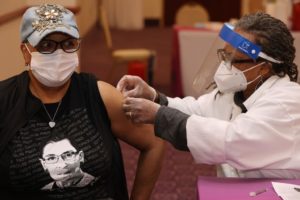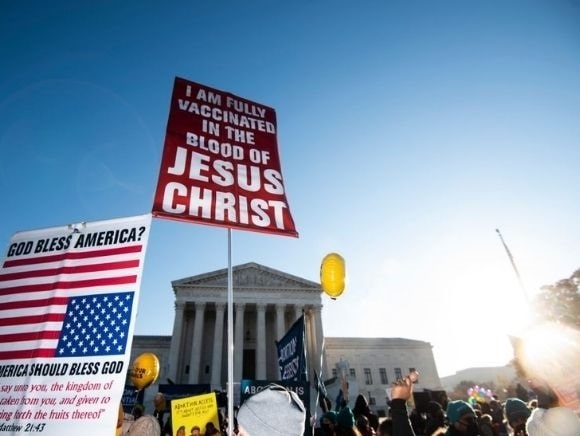On Jan. 7, the Supreme Court will address two vaccine mandate cases fast-tracked to its calendar just before Christmas. In National Federation of Independent Business v Department of Labor, the Court hears a challenge to the mandate ordering that private-sector businesses with 100 or more workers require their employees to either get an approved COVID-19 vaccination or undergo weekly testing. In Biden v Missouri, the justices will consider a different federal directive, one requiring most workers at health care facilities that receive Medicare or Medicaid funds to be vaccinated or exempted due to medical or religious considerations.
Consolidating Problems

(Photo by Chip Somodevilla/Getty Images)
These two cases consolidate four separate ones, all of which requested immediate action from the high court. In each case, anti-mandate litigants and coalitions have argued that the Supreme Court should block implementation of any vaccine directive until the cases challenging them have a full hearing in lower courts. In a mirror argument, challenging any stay in implementation, the Biden administration argues the opposite. Biden’s lawyers say the mandates should be implemented while the cases are fought.
The Supreme Court’s brisk action in consolidating the cases and rushing them to the courthouse will, it is hoped, mop up the legal mess spawned by vaccine diktats. It’s hard to count the number of challenges, appeals, stays, and injunctions issued by the various district and appeals courts regarding such cases. We shouldn’t expect the Court to announce whether any of the mandates are constitutional but merely whether they will be allowed to go into effect while constitutionality is debated in the lower courts.
Out of the Shadows
Since the Court is ruling on competing motions to stay other decisions and judgements, why not just issue an order in each case? The Supreme Court has issued many rulings on big cases, especially overturning lower court injunctions, not with a full hearing but simply as an order to a lower court. Amy Howe of SCOTUSBlog said:
“It seemed more likely that the court would dispose of the requests with a brief order, as it normally does on the so-called ‘shadow docket.’ Instead, and perhaps in response to criticism of the increased use of the shadow docket to litigate major policy disputes, the justices fast-tracked the cases for oral argument, as they have already done twice this year [2021] when fielding requests for emergency relief …”
The term shadow docket was coined by law professor William Baude, who criticized the Supreme Court’s increased use of orders to dispense with petitions. He wrote about the vast superiority of a merits hearing, compared to direct orders without public discussion: “We know what the voting rule is; we know that the results of the voting rule will be explained in a reasoned written opinion; and we know that each Justice will either agree with it or explain his or her disagreement.”
Major Questions
 Challenges to the various mandates include some related to the free exercise of religion and the failure of the Occupational Safety and Health Administration (OSHA) to follow normal rulemaking procedures. Others are based on OSHA leveraging a seldom-used, tangentially relevant rule to implement a sweeping vaccine fiat without anything approaching specific authorization, violating the major questions doctrine. That doctrine, a canon of statutory interpretation, says: “Where a congressional grant of authority to an executive branch agency has significant economic and political repercussions, courts look for a ‘clear statement’ of legislative intent.”
Challenges to the various mandates include some related to the free exercise of religion and the failure of the Occupational Safety and Health Administration (OSHA) to follow normal rulemaking procedures. Others are based on OSHA leveraging a seldom-used, tangentially relevant rule to implement a sweeping vaccine fiat without anything approaching specific authorization, violating the major questions doctrine. That doctrine, a canon of statutory interpretation, says: “Where a congressional grant of authority to an executive branch agency has significant economic and political repercussions, courts look for a ‘clear statement’ of legislative intent.”
Will the Court allow people to keep their jobs while the debate rages on, or permit the government to require companies to treat the unvaccinated as “lesser thans” while they seek redress slowly through the courts? And then, only after the mandates have forced them to choose between an unwelcome preventative medical “treatment” and the employment they count on to feed their families?
The Supreme Court is closed to the public due to the pandemic, but arguments are available in audio form from the Court’s website.
~ Read more from Scott D. Cosenza.




